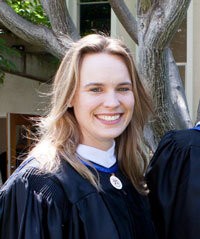
Elizabeth Garlow
Citation
Written by Michael Sweeney, OP on May 2019 at the Induction into The DSPT College of Fellows
Elizabeth Garlow, founder, educational and social entrepreneur, loyal daughter of the Church, the Dominican School of Philosophy and Theology salutes you.
In his encyclical letter, Caritas in Veritate, Pope Benedict XVI spoke appreciatively of a new initiative in business which has come to be called “social impact investment”:
When we consider the issues involved in the relationship between business and ethics, as well as the evolution currently taking place in methods of production, it would appear that the traditionally valid distinction between profit-based companies and non-profit organizations can no longer do full justice to reality, or offer practical direction for the future. In recent decades a broad intermediate area has emerged between the two types of enterprise. It is made up of traditional companies which nonetheless subscribe to social aid agreements in support of underdeveloped countries, charitable foundations associated with individual companies, groups of companies oriented towards social welfare, and the diversified world of the so-called “civil economy” and the “economy of communion”. This is not merely a matter of a “third sector”, but of a broad new composite reality embracing the private and public spheres, one which does not exclude profit, but instead considers it a means for achieving human and social ends (Caritas in Veritate, 46).
Through your many initiatives in social entrepreneurship, you have become one of the leading exponents of impact investment in this country.
Having completed your undergraduate work at Kalamazoo College you went on to pursue a Masters Degree in Public Affairs at Princeton’s Woodrow Wilson School of Public and International Affairs.
In 2008 you were appointed Business Development Officer at Accion U.S.A., the nation’s largest micro-loan program, where you worked with the Boston Beer Co., maker of Samuel Adams, to share the brewer’s expertise with 1,000 local businesses.
Returning to your native Detroit in 2012, you accepted the post of Executive Director of Michigan Corps where, at the age of 28, you founded the Pure Michigan Entrepreneurship Challenge, the nation’s first coordinated public-private collaboration to advance social entrepreneurship. You invited to your board Eric Schmidt, Chairman and CEO of Google and Scott McNealy, founder of Sun Microsystems to create business models to address such problems as unemployment, urban revitalization and health and nutrition.
Your next challenge was to serve at the White House as community solutions fellow and domestic policy advisor during the Obama Administration, where you managed the president’s Promise Zones Initiative to create jobs, improve educational outcomes and support economic growth and affordable housing in twenty-two designated communities in the country.
You are currently Impact Investment Officer at Lumina, investing in companies that provide equitable access to post-secondary credentialing and skill-building opportunities to prepare young people for employment in the twenty-first-century economy.
You serve on the Board of Directors of Bitwise, a technology company in Fresno, California that teaches coding to women and minorities and that has created over 2,000 jobs in the Fresno community. You also serve as a Member of the Board of Economy of Communion North America, a community of entrepreneurs founded upon the Focolare movement that focuses upon the intersection of spirituality and business.
You have characterized yourself as “focused on an economy of belonging.” This, we are convinced, could serve as a superb summary of the Church’s social teaching on the economy and of what Pope Francis has called “an integral human ecology.” We are honored that you have accepted our invitation to enter into conversation with us concerning the interface of faith and culture as a member of the College of Fellows.
Therefore, as an expression of our esteem and gratitude, and in virtue of the authority invested in me by the Board of Trustees of the Dominican School of Philosophy and Theology, I am privileged to bestow upon on you, Elizabeth Garlow, the degree of Doctor of Humane Letters honoris causa, and to name you as a Fellow of the School.
